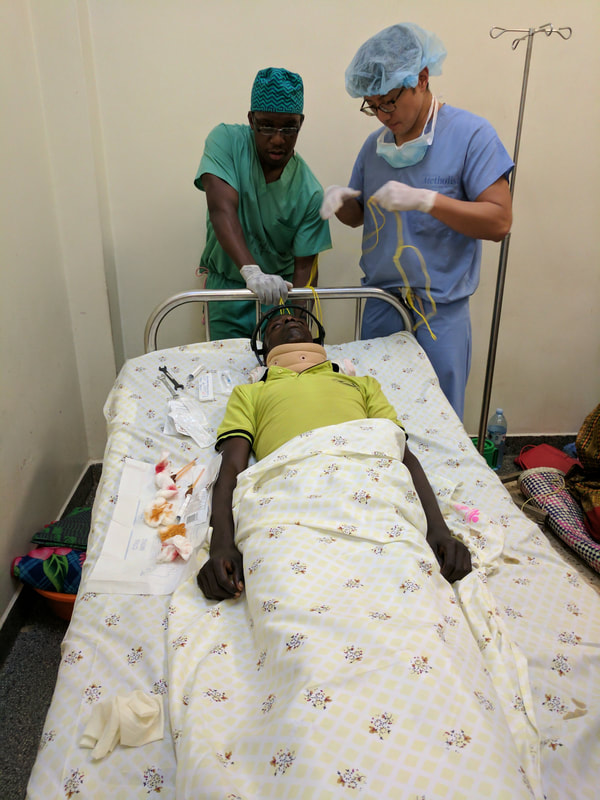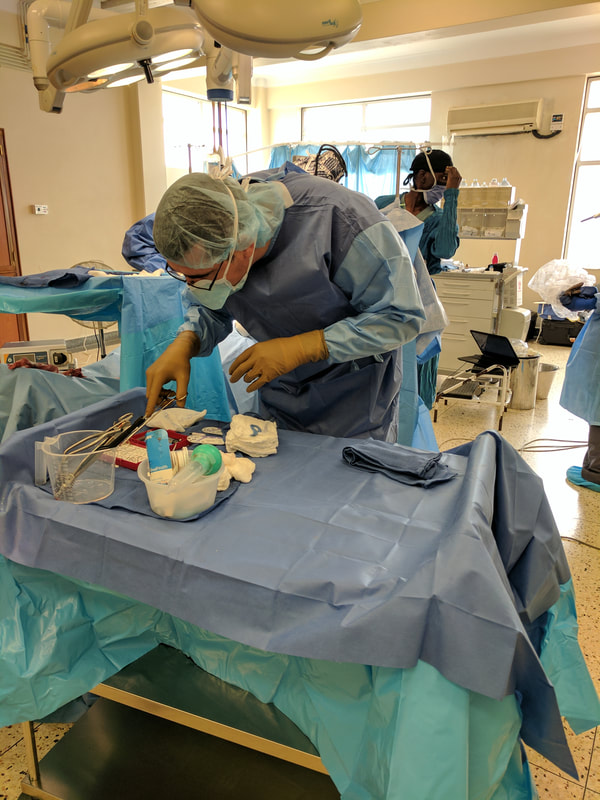The night prior, we planned six cases for the day; Four fusions (on four women named Nataria, Mary, Monica and Gertrude), a soft tissue removal (a gentleman named Deus), and one simple decompression (a patient named Night), but none of us were quite prepared for the eight cases that actually came to be. Breakfast was, as per usual. Team all together, discussing the day, but with more focus this morning on who would be in which OR with who, what cases they'd be doing, and the time we expected each case to take. But, life is full of surprises.
At the hospital, Natasha, Alexis and I all ran rounds, and as patients were being discharged, rounds became faster. At the start of rounds, we picked up a new case in the emergency room when checking on our first Halo patient; another cervical fracture, this gentleman (named Wilber) was neurologically intact (meaning he could move all limbs and extremities, showing no spinal cord damage), and was a candidate either for a surgery or another Halo. Dr. St. Clair recommended, since he's a young patient, to attempt the Halo first to keep as much of his range of motion as intact as possible. Meanwhile, all the patients from the previous day (Allen, Victor, Gudena, and Mary) were doing significantly better, with all of them being able to stand up, and three of them were able to walk a short distance. Patients from previous days such as Annah from one of Friday's cases, and Bernard from the week prior's Wednesday, were all able to be discharged home. Other patients had to remain a few days longer, just to see continued, desired improvement. Julius started a much stronger recovery now that the antibiotics had been working for a short period. With rounds over, and all our patients checked on, the three of us made our way to the OR.There, the cases had already begun, with the cases starting in three rooms (we'd later go down to two rooms this day, which has been standard for us); We'd handle two of the fusions, while one of the local doctors handled the mass removal (which, due to the nature of the mass, resulted in an amputation of the arm). With these cases underway, the three of us from rounds parted ways to go where we were needed in the rooms.
The fusions, thankfully, were small fusions, ranging from a simple one level fusion to a three level fusion. But, each fusion takes time to complete, as you don't want to rush and accidentally lead to damage. As time passed, each fusion passed, and close to mid afternoon, we'd finished all the fusions. Between the fusions and decompression, we placed another Halo on the emergency case, Wilber, in an attempt to begin a reduction (it was also an attempt to avoid surgery).
With the halo quickly completed, we added some traction to aid in the natural reduction and then we moved onto the decompression, and during this, we had another case appear on us; a young woman named Justine, who had severe pain in her hip. While Dr. St. Clair took care of the decompression, Dr. Huang did a quick steroid injection in her joint. Prior to the injection, she complained of severe pain any time she walked, but once completed, she was immediately able to walk comfortably.
The day came to a close late at night, and exhausted, we all headed out to eat dinner. We knew the day was going to be long, and with all the patients treated, it felt like it took a century to complete. But, we were all extremely satisfied with our all hard work... and utterly exhausted! As we called it a night, we thought about our upcoming last day of operating, and the patients we could once again make an impact on.
At the hospital, Natasha, Alexis and I all ran rounds, and as patients were being discharged, rounds became faster. At the start of rounds, we picked up a new case in the emergency room when checking on our first Halo patient; another cervical fracture, this gentleman (named Wilber) was neurologically intact (meaning he could move all limbs and extremities, showing no spinal cord damage), and was a candidate either for a surgery or another Halo. Dr. St. Clair recommended, since he's a young patient, to attempt the Halo first to keep as much of his range of motion as intact as possible. Meanwhile, all the patients from the previous day (Allen, Victor, Gudena, and Mary) were doing significantly better, with all of them being able to stand up, and three of them were able to walk a short distance. Patients from previous days such as Annah from one of Friday's cases, and Bernard from the week prior's Wednesday, were all able to be discharged home. Other patients had to remain a few days longer, just to see continued, desired improvement. Julius started a much stronger recovery now that the antibiotics had been working for a short period. With rounds over, and all our patients checked on, the three of us made our way to the OR.There, the cases had already begun, with the cases starting in three rooms (we'd later go down to two rooms this day, which has been standard for us); We'd handle two of the fusions, while one of the local doctors handled the mass removal (which, due to the nature of the mass, resulted in an amputation of the arm). With these cases underway, the three of us from rounds parted ways to go where we were needed in the rooms.
The fusions, thankfully, were small fusions, ranging from a simple one level fusion to a three level fusion. But, each fusion takes time to complete, as you don't want to rush and accidentally lead to damage. As time passed, each fusion passed, and close to mid afternoon, we'd finished all the fusions. Between the fusions and decompression, we placed another Halo on the emergency case, Wilber, in an attempt to begin a reduction (it was also an attempt to avoid surgery).
With the halo quickly completed, we added some traction to aid in the natural reduction and then we moved onto the decompression, and during this, we had another case appear on us; a young woman named Justine, who had severe pain in her hip. While Dr. St. Clair took care of the decompression, Dr. Huang did a quick steroid injection in her joint. Prior to the injection, she complained of severe pain any time she walked, but once completed, she was immediately able to walk comfortably.
The day came to a close late at night, and exhausted, we all headed out to eat dinner. We knew the day was going to be long, and with all the patients treated, it felt like it took a century to complete. But, we were all extremely satisfied with our all hard work... and utterly exhausted! As we called it a night, we thought about our upcoming last day of operating, and the patients we could once again make an impact on.


 RSS Feed
RSS Feed
